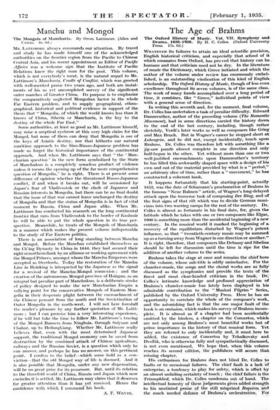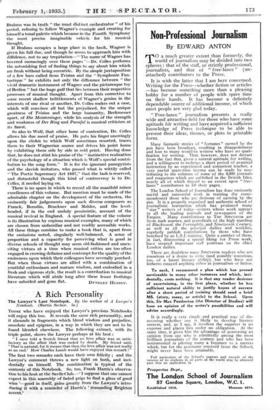The Age of Brahms
Press. 17a 6d.)
WHATEVER its failures to attain an ideal scientific precision, English historical criticism, and especially that school of it which emanates from Oxford, has proved that history can be,.
humane and that criticism need not be dry. In the literature of music the Dictionary, which Grove initiated and which the author of the volume under review has enormously embelr lished, is an outstanding vindication of this kind of English scholarship. The Oxford History of Music, though of less even excellence throughout RA seven volumes, is of the same class. The work of many hands accomplished over a long period of time, it combines, like " Grove," individual points of view with a general sense of direction.
In writing this seventh and, for the moment, final volume, Dr. Colles has undertaken a task of peculiar difficulty. Edward Dannreuther, author of the preceding volume (The Romantic
Movement), had in some directions carried the history down- to the end of the last century, including, though rather sketchily, Verdi's later works as well as composers like Grieg and Max Bruch. But in Wagner's career he stopped short at Lohengrin, and he did not, except incidentally, touch upon Brahms. Dr. Colles was therefore left with something like a jig-saw puzzle almost complete in one direction and only half-begun in the other. Yet without more than one or two well-justified encroachments upon Dannreuther's territory he has filled this awkwardly shaped space with a design of his own and out of the material provided by what is a " period," an arbitrary slice of time, rather than a " movement," he has constructed a coherent book.
It happens fortunately that his starting-point, actually 1853, was the date of Schumann's proclamation of Brahms in the famous "Neue Bahnen" article, of Wagner's long-delayed attack upon the immense task of composing Der Ring, and of the first signs of that rift which was to divide German musi- cians into two warring camps for the rest of the century. Dr. Colles is almost as fortunate in his final date, for, given the latitude which he takes with one or two composers like Elgar, 1900 is something more than the accidental beginning of a new century. In the musical world it marked the beginning of a recovery of the equilibrium disturbed by Wagner's potent influence, so that " twentieth-century music may be summed up as a turning away from Wagner in one direction or another." It is right, therefore, that composers like Debussy and Sibelius should be left for discussion until the time is ripe for the addition of another volume to the series.
Brahms takes the stage at once and remains the chief hero of the volume, whose sub-title is oddly uninelusive. For the chamber-music, the songs and the choral works are as fully discussed as the symphonies and provide the texts or the finest and most clear-headed criticism in the book. Dr: Colles's intimate knowledge and profound appreciation of Brahms's chamber-music has lately been displayed in his admirable contribution to the " Musical Pilgrim " Series, published by the _Oxford University Press. Here he has an opportunity to correlate the whole of the composer's work, and the astonishing fact is that the one major fault of the book is an omission, which makes his survey of Brahms incom- plete. It is almost as if a chapter had been accidentally omitted by the binders, a chapter on the Concertos, which are not only among Brahms's most beautiful works but of prime importance in the history of that musical form. Yet they are referred to only incidentally and, it must here be added, the existence of Concertos by Tchaikovsky and Dvalk, who is otherwise fully and sympathetically discussed, is not even mentioned. We hope that, when this volume reaches its second edition, the publishers will secure that missing chapter,
His enthusiasm for Bnihms does not blind Dr. Colles to faults or to occasional failures. The chief fault is a lack of enterprise, a tendency to play for safety, which is offset by an almost unfailing certainty of touch ; the chief failure is the Triumphlied, which Dr. Colles condemns out of hand. The intellectual honesty of these judgements gives added strength to his unstinted praise of the still misprized Requiem and the much needed defence of Brahins's orchestration. For
Brahms was in truth " the most distinct orchestrator " of his period, refusing to follow Wagner's example and creating for himself a tonal palette which became in the Fourth Symphony the most precise, imaginable vehicle for his musical thought.
If Brahms occupies a large place in the book, Wagner is given his full due, and though he seems to approach him with diffidence, not to say trepidation—" The name of Wagner has hovered menacingly over these pages "—Dr. Colles performs the astonishing feat of finding things to say about him which arc fresh without being eccentric. By the simple juxtaposition of a few bars culled from Tristan and the Symphonic Fan- tastique " he exhibits not only the difference between " the vivid dramatic instrument of Wagner and the picturesque toy of Berlioz " but the huge gulf that lies between their respective processes of musical thought. Apart from this corrective to some recent shallow belittlements of Wagner's genius in the interests of one rival or another, Dr. Colles makes out a case, which will convince all but the prejudiced, for the unique greatness of Tristan and the large humanity, Beclunesser apart, of Die Meistersinger, while his analysis of the strength and weakness of Der Ring and Parsifal is musical criticism at its finest.
So also to Wolf, that other bone of contention, Dr. Colles allows his due meed of praise. He puts his finger unerringly upon the clichés to which Wolf sometimes resorted, traces them to their Wagnerian source and drives his point home by exhibiting them side by side in cold print. Having done that, he does not stint his praise of the " instinctive realization of the psychology of a situation which is Wolf's special contri- bution to the song form." It is for the ignorant panegyrists and the slavish imitators, who passed what is wittily called The Poetic Supremacy Act 1887," that. the lash is reserved, and distasteful though this kind of controversy is to Dr. Colles, it needed laying on.
There is no space in which to record all the manifold minor excellences of this volume. But mention must be made of the admirable chapter on the development of the orchestra, the eminently fair judgements upon such diverse composers as Franck, Borodin, Bruckner and Mahler, and the level- headed, if in the end unduly pessimistic, account of the musical revival in England. A special feature of the volume is its illustration by copious musical examples, many of which are chosen from unfamiliar and not readily accessible works. All these things combine to make a book that is, apart from the omissions noted, singularly well-balanced. A sense of proportion and a capacity for perceiving what is good in diverse schools of thought may seem old-fashioned and unex citing virtues at a time when musical critics are too often engaged in crowing defiance and contempt for the quality of the eminences upon which their colleagues have severally perched.
But when those virtues are allied with a combination of youthful enthusiasm and mature wisdom, and embodied in a fresh and vigorous style, the result is a contribution to musical literature which will abide long after these lesser frothings















































 Previous page
Previous page